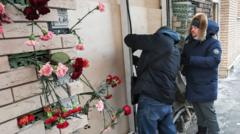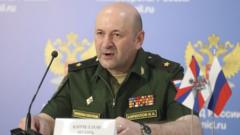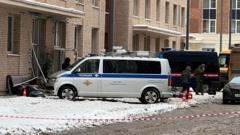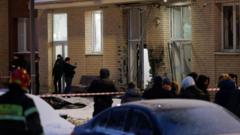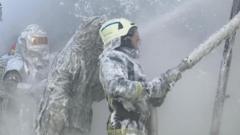The assassination of a high-ranking military official just steps away from residential areas forces a stark confrontation with the realities of war for Moscow’s citizens, previously perceived as distant.
**Assassination of General in Moscow Signals Evolving Threat of War’s Proximity**

**Assassination of General in Moscow Signals Evolving Threat of War’s Proximity**
The murder of Lt Gen Igor Kirillov sharply disrupts the façade of normalcy in a Moscow navigating the ongoing war with Ukraine.
In a shocking escalation of violence, the early morning bombing in Moscow that claimed the lives of Lt Gen Igor Kirillov and his assistant Ilya Polikarpov highlights the increasing threat of the Ukraine war infiltrating everyday life in the Russian capital.
While life in Moscow has continued with apparent normalcy amid the ravages of nearly three years of conflict, Tuesday's assassination disrupted this illusion. As civilians go about their lives—travelling on the Metro or socializing in bars—a dark reminder of the war’s reality surfaced, astonishing many citizens who have largely perceived the conflict as remote and virtual.
Witnesses to the bombing, which involved a device cleverly disguised on an electric scooter, expressed their fear and shock following the incident. One resident, Liza, articulated her unease, “Until now, it felt as if the war was a long way off - now someone is dead, here, you can feel the consequences.” Her sentiments reflect a broader concern as the violence that characterizes the war intrudes upon the daily lives of ordinary Russians.
The sense of disconnection many felt toward the ongoing conflict in Ukraine, often viewed via screens, suddenly crystallized when confronted with the stark reality of assassination on home turf. The abrupt shift from perceived safety to vulnerability could prove monumental for a populace mostly insulated from the war’s brutalities.
However, experts suggest that the Kremlin is unlikely to change its aggressive stance as a result of this incident. In the wake of the assassination, state media promptly placed blame on Ukraine, with former leadership figures expressing calls for retribution. The rhetoric from state officials indicates an intent to escalate rather than de-escalate tensions, fueling fears of increased conflict.
The Kremlin has yet to issue any comments from President Vladimir Putin regarding the assassination. His previous statements suggest a commitment to retaliate against perceived threats, hinting at a future escalated conflict rather than domestic reflection or policy shifts.
As the anniversary of the Ukraine conflict approaches, the real implications of Kirillov’s assassination on Russia’s military and political strategies remain uncertain. All eyes will be on Putin’s upcoming end-of-year press conference, where the nation awaits his insights on both the assassination and the future trajectory of Russia amid the ongoing crisis. The haunting proximity of warfare and domestic safety will continue to challenge the perspective of everyday Russians, testing their resilience in unprecedented ways.
While life in Moscow has continued with apparent normalcy amid the ravages of nearly three years of conflict, Tuesday's assassination disrupted this illusion. As civilians go about their lives—travelling on the Metro or socializing in bars—a dark reminder of the war’s reality surfaced, astonishing many citizens who have largely perceived the conflict as remote and virtual.
Witnesses to the bombing, which involved a device cleverly disguised on an electric scooter, expressed their fear and shock following the incident. One resident, Liza, articulated her unease, “Until now, it felt as if the war was a long way off - now someone is dead, here, you can feel the consequences.” Her sentiments reflect a broader concern as the violence that characterizes the war intrudes upon the daily lives of ordinary Russians.
The sense of disconnection many felt toward the ongoing conflict in Ukraine, often viewed via screens, suddenly crystallized when confronted with the stark reality of assassination on home turf. The abrupt shift from perceived safety to vulnerability could prove monumental for a populace mostly insulated from the war’s brutalities.
However, experts suggest that the Kremlin is unlikely to change its aggressive stance as a result of this incident. In the wake of the assassination, state media promptly placed blame on Ukraine, with former leadership figures expressing calls for retribution. The rhetoric from state officials indicates an intent to escalate rather than de-escalate tensions, fueling fears of increased conflict.
The Kremlin has yet to issue any comments from President Vladimir Putin regarding the assassination. His previous statements suggest a commitment to retaliate against perceived threats, hinting at a future escalated conflict rather than domestic reflection or policy shifts.
As the anniversary of the Ukraine conflict approaches, the real implications of Kirillov’s assassination on Russia’s military and political strategies remain uncertain. All eyes will be on Putin’s upcoming end-of-year press conference, where the nation awaits his insights on both the assassination and the future trajectory of Russia amid the ongoing crisis. The haunting proximity of warfare and domestic safety will continue to challenge the perspective of everyday Russians, testing their resilience in unprecedented ways.


